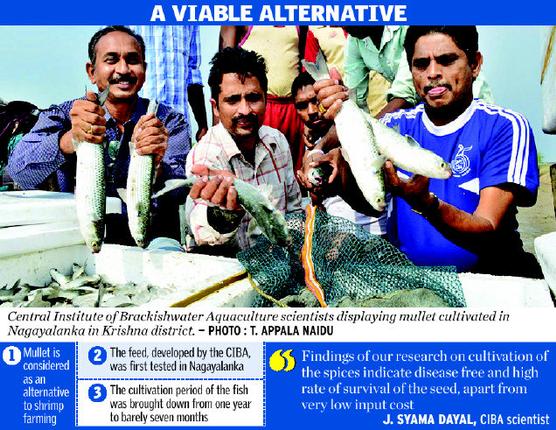The cultivation period of the fish, which is considered an alternative variety to shrimp, was brought down from one year to barely seven months
The Central Institute of Brackishwater Aquaculture (CIBA), Chennai, in collaboration with Nagayalanka-based progressive farmer has scripted a success story by bringing down the cultivation period of Gold Mullet (Liza Parsia) and Grey Mullet (Mugil Cephalus) fish with the help of ‘formulated feed’.
The feed was developed by the CIBA and tested for the first time in Nagayalanka in Andhra Pradesh in the country. The cultivation period of the fish, which is considered an alternative variety to shrimp, was brought down from one year to barely seven months, drawing the attention of the worried shrimp farmers.
On Wednesday, CIBA Principal Scientists K. Ambasankar and J. Syama Dayal came with up their findings following harvesting of the mullet species on an acre of pond here.
The seed grown in the pond was collected from estuary and brackish water canals.
“Findings of our research on cultivation of the spices indicate disease free and high rate of survival of the seed, apart from very low input cost,” Mr. Syama Dayal told The Hindu. However, the CIBA scientists experimented on these two species in their quest to come out with alternative to the shrimp, which was driving the farmer into irreparable loss in recent years.
Experiment
“The experiment on Liza Parsia and Mugil Cephalus in abandoned ponds where earlier shrimp was cultivated is a way for those failed to reap profits in shrimp cultivation. Farmers have already begun slowly inquiring about details such as input cost,” said Mr. Ambasankar.
Beyond expectations
According to Raghu Sekhar who cultivated the fish in his pond, growth of the mullet species was beyond expectations, wooing other farmers to try their luck. “No disease is found during the seven-month cultivation period, withstanding changes in the weather and the soil of the pond,” added Mr. Sekhar.
Given the market value for value added to the Mullet Roe (egg) of the species, European countries and Japan are importing it in a large scale.
On the other hand, the CIBA was engaged in developing seed of the mullet species by the end 2016, according to scientists.
source: http://www.thehindu.com / The Hindu / Home> News> Cities> Vijayawada / by T. Appala Naidu / Nagayalanka – November 13th, 2014
